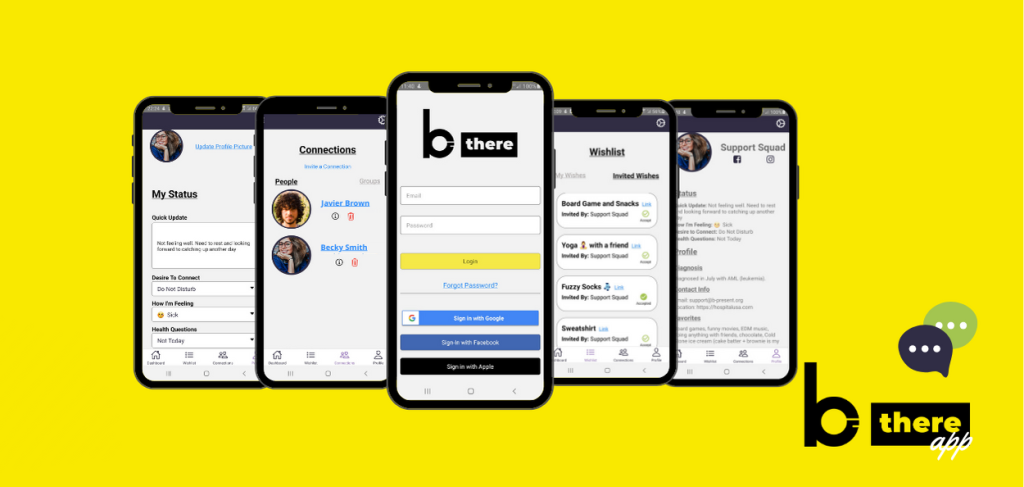Navigating cancer as a young adult can be incredibly isolating. The whirlwind of medical appointments, treatments, and the physical and emotional toll of the disease can make it challenging to maintain the social life you once had. However, staying connected with friends is crucial for your emotional well-being and can provide a sense of normalcy amidst the chaos. Here are some practical tips to help you stay engaged with your social circle during cancer.
Be Open About Your Needs
Communication is key. Your friends might not always know how to approach you or what to say. Be open about your needs and boundaries. Let them know when you feel up for a chat or a visit and when you need some space. This honesty helps your friends understand how to support you best and keeps your relationships strong.
b-there, a connection and support app, allows you to share your status, mood, and desire to connect each day. Supporters can check the app before they connect or come by.
Staying Connected with Technology
Thanks to technology, staying connected has never been easier. Utilize video calls, messaging apps, and social media to keep in touch with friends. Virtual hangouts can be a great way to maintain regular contact. You can have movie nights via streaming platforms, play online games, or simply catch up over a video call.
Plan Low-Energy Activities
Physical energy levels can fluctuate during treatment, so plan activities that you love that don’t require much exertion. Invite friends over for a cozy movie marathon, a board game session, or a crafting afternoon. These low-energy activities can be just as fulfilling as more active outings and allow you to spend quality time together without overexerting yourself.
Join Support Groups
Sometimes, connecting with others who are going through similar experiences can be incredibly validating and comforting. Look for local or online support groups for young adults with cancer. These groups can provide a sense of community, offer new friendships, and be a valuable source of support and understanding.
If you are interested in attending a San Diego Young Adult Survivor Social event hosted by b-present, fill out the form and we will send you more details as they become available.
Keep Your Friends Updated
Regularly updating your friends about your health can help them feel involved and informed. Whether it’s through a group chat, a blog, social media updates, or the b-there app, sharing your progress, challenges, and victories helps your friends stay connected to your experience and can prompt them to reach out with support and encouragement.
Ask for Help
Don’t hesitate to ask for help when you need it. Friends often want to help but might not know how. Whether it’s running errands, driving you to appointments, or just being there to listen, letting your friends know how they can support you can strengthen your bond and provide you with the help you need.
Celebrate Small Victories
Finding joy in small victories can make a big difference. Celebrate milestones, no matter how minor they may seem. Invite friends to join you in these celebrations, whether it’s finishing a round of treatment, good news from your doctor, a cancerversary, or simply having a good day. These moments of joy can uplift your spirits and create positive memories during tough times.
Add to reading list: Celebrating Your Cancerversary
Set Up a Buddy System
Having a designated “cancer buddy” can be incredibly beneficial. This person can be a close friend or family member who keeps you company during treatments, helps manage your schedule, and provides emotional support. A buddy system ensures you have a consistent support person by your side, making the experience less lonely.
Staying connected with friends during cancer requires effort and creativity, but it’s entirely possible. By being open about your needs, leveraging technology, and planning low-energy activities, you can maintain and even strengthen your friendships. Remember, your friends care about you and want to support you – sometimes, all it takes is letting them know how they can help.
Cancer might interrupt your social life, but it doesn’t have to end it. Embrace the support of your friends and let their presence be a source of strength and normalcy during this challenging time.


